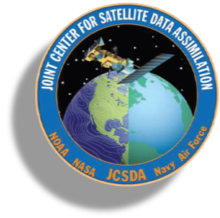14th JCSDA technical review meeting & science Workshop on Satellite data Assimilation
May 31-June 2, 2016
Introduction
The purpose of the annual JCSDA technical review meeting and science workshop is to review the ongoing and planned scientific development sponsored by the NASA-NOAA-DOD Joint Center for Satellite Data Assimilation, and to coordinate these efforts, both internally and with the outside research community involved in the satellite data assimilation (especially those directly funded by the JCSDA through FFO and/or ROSES programs). Two full and one half days will be devoted to the meeting with plenty of time for discussions, interactions, scientific exchanges and formal presentations, both among scientists from all JCSDA partners and with JCSDA managers. Formal recommendations from working groups discussions that take place during the meeting, are reviewed by the JCSDA management on an annual basis, and serve as one of the inputs when developing technical directions of the JCSDA future activities. The JCSDA has the following six primary scientific priority areas, approved by the JCSDA science steering committee:
Radiative Transfer Modeling (CRTM)
Preparation for assimilation of new data and data from new instruments
Assimilation of satellite data impacted by clouds and precipitation
Assimilation of land surface satellite observations
Assimilation of ocean surface satellite observations
Atmospheric composition; chemistry and aerosol
Additional focus areas have recently emerged across the JCSDA partners institutions. These include, but are not limited to:
Atmospheric Motion Vectors (AMVs) data assimilation
O2R/R2O activities
Data denials and Observing System Simulation Experiments (OSSEs)
The JCSDA supports scientific development work in multiple areas via internal, directed, and external research projects with the purpose of accelerating and optimizing the assimilation of satellite data. External research is funded via grants and contracts awarded through a competitive process open to the broader scientific community. In addition, the JCSDA partners conduct their own internal projects, some of which are directly related to the JCSDA priorities. These projects are labeled internal or in-kind contributions to JCSDA. It is essential that all these efforts be complementary and coordinated. The JCSDA technical review meeting and science workshop aims at facilitating this coordination.
Organization of the Meeting
At the meeting, JCSDA Principal Investigators of internal, directed and external projects and affiliated scientists are expected to report on progress and participate in discussions about future plans of the Joint Center.
The JCSDA technical review meeting and science workshop on satellite data assimilation will include both oral presentations (in plenary session), including invited talks, and posters. No parallel sessions will be held. In order to allow for open discussion, plenty of time will be available to presenters to interact with the audience. Adequate visibility will be provided to contributions from all scientific priority areas as well as emerging ones. Externally funded scientists are expected to attend and should give a progress report and indicate what they plan to do over the next year. An oral presentation is expected from the externally funded scientists.
There will also be a dedicated poster session. Note that posters will be mounted on their panels the first morning of the meeting and will remain on display until the end of the meeting. This arrangement will allow scientists to discuss the content of the posters not only during the poster session but also during coffee breaks and lunch breaks.
The duration of the meeting will be two full and one half days (the first day being a half day, and the last two days being full days).
If you have any questions regarding the workshop, please contact René Brown.
Fee, Registration and deadlines:
Participation in the meeting is free of charge. Arrangements for beverages and snacks during coffee breaks and lunch breaks are being made and more information will be shared when it becomes available.
To register, visit: http://jcsda14thwkshp.eventbrite.com and enter your information, including your intention to give a presentation at the meeting. Registration should be made by April 8, 2016. Alternatively, you may register by sending an email to Erin Jones, René Brown, and Ana Carrion, with a CC to Jim Yoe and Thomas Auligné by April 8, 2016.
If sending an e-mail, please include the following:
Name and organization, as you would like it to appear on your name badge
Contact information (e-mail, work phone)
Whether you are planning to present
If you are planning to present, please include:
Your preference for an oral or poster presentation. Please note that the organizing committee might modify this choice
The title of your presentation
The presenter's name and co-author names
If you have any questions regarding registration or this website, please contact Erin Jones.
Location
The 14th JCSDA Technical Review Meeting and Science Workshop on Satellite Data Assimilation is being coordinated by the NRL, and will take place at the Moss Landing Marine Laboratories - 8272 Moss Landing Rd, Moss Landing, CA 95039.
Additional Information on Presentation Materials
Presenters (both oral and poster) are encouraged to submit their presentations (in pdf or ppt format) ahead of time to Erin Jones, with CC to René Brown, Tanya Maurer, and Jim Yoe.
Posters
Please provide your poster in portrait/vertical format, and no larger than 36" x 46". You can mount your poster with tape or pushpins.
Place the title at the top center of the poster.
Use 72 point letters.
Avoid hand drawn materials.
Keep it simple.
Do not post the pages of your paper.
Make sure it has a logical flow.
Use color, graphics, charts, and photos.
Key points should be in large type.
Do not try to tell the entire story on the panel.
Save some key points for the one-on-one discussion.
Check the program for the set up and presentation time for your session.
Oral Presentations
Please refer to the program for your session date and time. This program will be made available in a future circular, after the registration deadline (April 8, 2016).
